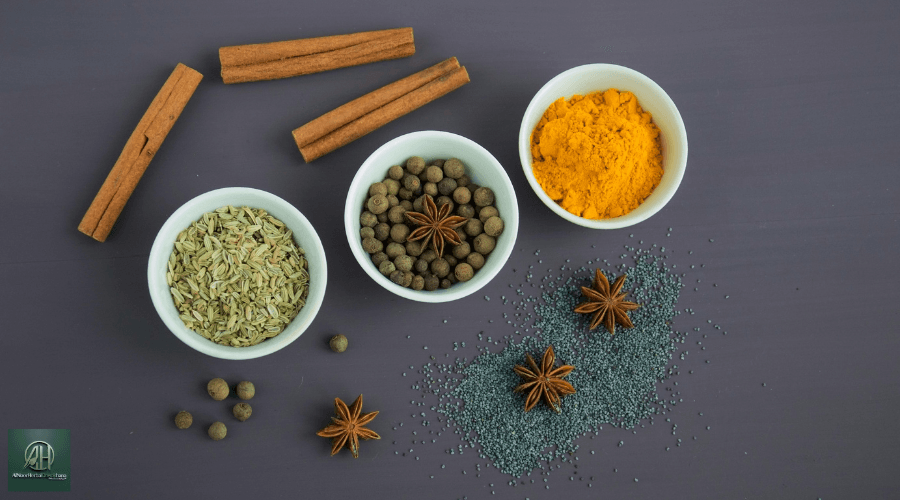Table of Contents
Herbal Treatments for IBS
Introduction
Natural Remedies for Gut Health Introduction Irritable Bowel Syndrome (IBS) creates problems throughout millions of people across the globe who experience troublesome effects on their digestion. A large number of patients with IBS seek herbal alternatives as natural therapies for managing their symptoms.. Herbal therapies concentrate on calming the digestive system while reducing inflammation together with enhancing digestive processes. The following section examines tested herbal solutions for treating IBS symptoms.
Understanding IBS and Its Symptoms
Colon disease known as IBS persists in the human digestive system as a long-term medical condition. It leads to:
• Abdominal pain
• Bloating
• Diarrhea or constipation
• Gas and cramping
The combination of stress and improper diet along with gastrointestinal imbalances serves as triggers. The symptoms related to IBS benefit from natural remedies based on various herbs.

Best Herbal Treatments for IBS
1. Peppermint Oil
Menthol present in peppermint oil helps to relax the intestines while it decreases stomach distension.
How to Use:
Enteric-coated peppermint oil capsules should be taken before eating.
Drink peppermint tea twice daily.
Benefits:
• Relieves abdominal pain
• Reduces bloating and gas
• Eases bowel irregularities
2. Ginger
Ginger shows anti-inflammatory characteristics that help the digestive system function better and minimize gastrointestinal distress.
How to Use:
Drink fresh ginger tea daily.
Take ginger supplements as directed.
Benefits:
• Soothes stomach cramps
• Enhances digestion
• Reduces nausea and bloating
3. Fennel Seeds
The relaxed muscle function of digestion caused by fennel seeds minimizes both gas buildup and bloating issues.
How to Use:
Fennel seeds should be chewed in a teaspoon amount following every meal.
• Drink fennel tea twice daily.
Benefits:
• Reduces bloating and cramps
• Improves digestion
• Relieves constipation
4. Chamomile
Chamomile tea acts as stress reduction therapy for IBS symptoms while promoting relaxation of intestinal functions.
How to Use:
• Drink chamomile tea before bed. The extract of chamomile plants should be applied in warm water.
Benefits:
• Eases stress-induced IBS
• Reduces inflammation
• Promotes better digestion
5. Turmeric
How to Use:
• Add turmeric powder to meals.
• Take curcumin supplements.
Benefits:
• Reduces intestinal inflammation
• Improves digestion
• Alleviates IBS pain
Comparison of Herbal Treatments for IBS
| Herb | Main Benefit | How to Use | Recommended Dosage |
|---|---|---|---|
| Peppermint | Relieves bloating | Tea or capsules | Twice daily |
| Ginger | Soothes stomach | Tea or supplement | Daily |
| Fennel | Reduces cramps | Tea or chewing | After meals |
| Chamomile | Reduces stress | Tea or extract | Before bed |
| Turmeric | Anti-inflammatory, soothes stomach | Powder or supplement | Daily |
FAQs
1. Which Treated Approaches Are Risk-Free For IBS?
Medical consultation should precede the use of any new remedy despite the fact that most herbal treatments are safe.
2.What are the side effects of long use of herbal medicines?
The duration until herbal remedies start showing effect varies according to individual cases. Pain relief from herbal treatments normally becomes visible after several weeks of use.
3. Can I combine different herbs?
The proper method is to begin with one herbal remedy at a time and evaluate it before including additional ones.
4. Which side effects should herbal remedy users expect to experience?
Herbal use can lead to slight allergic reactions along with stomach discomfort in some people. Discontinue if symptoms worsen.
5. It is safe to combine herbal treatments with your medication under healthcare provider approval?
People should consult with their healthcare provider to prevent adverse effects with their prescription medications.
Summary
Natural remedies based on herbs provide individuals with a plant-based method to handle IBS symptoms while enhancing intestinal wellness. Soothing relief occurs when your body consumes peppermint and ginger along with fennel in addition to chamomile and turmeric. The best outcomes for managing IBS symptoms can be achieved by using herbal remedies together with a balanced diet and stress management practices as well as regular hydration. Obtaining professional medical advice provides the most detailed instruction.
You may also like :: Top Herbal Remedies For Quincy Illinois




